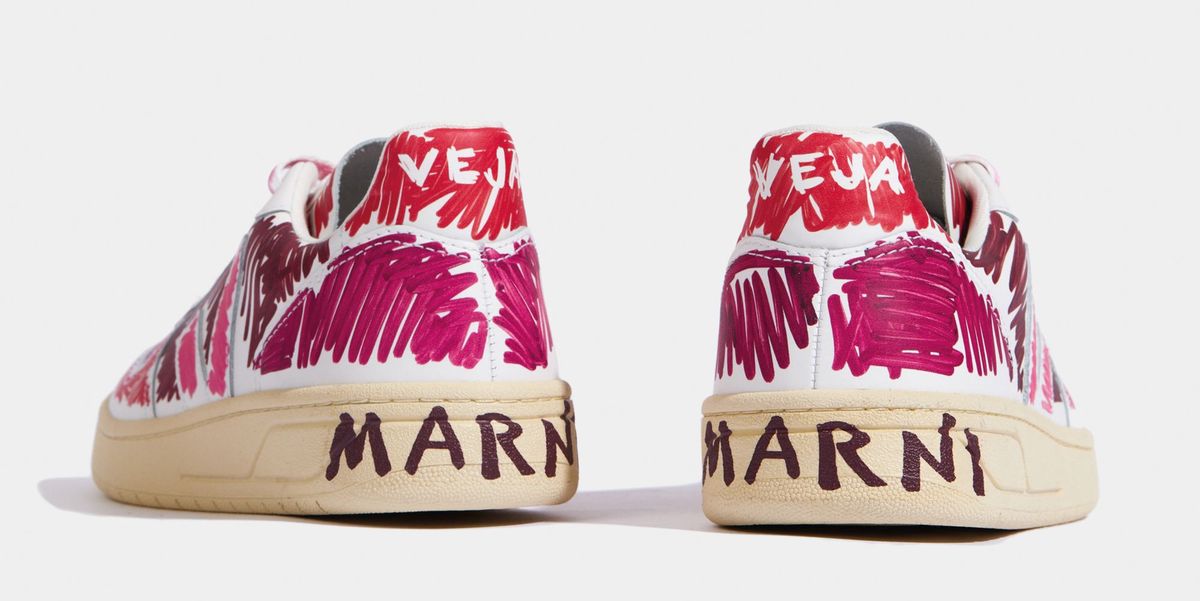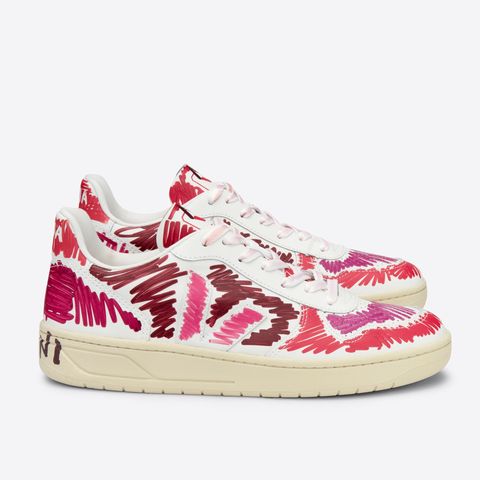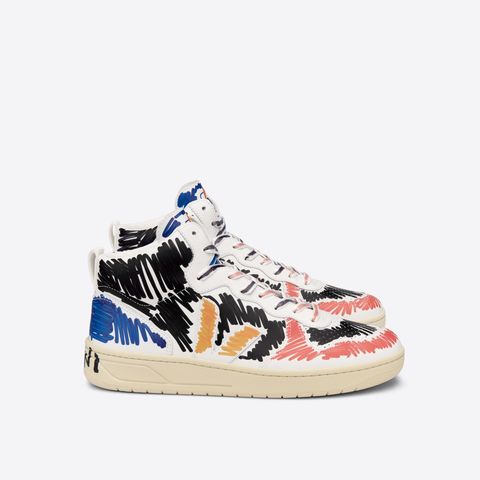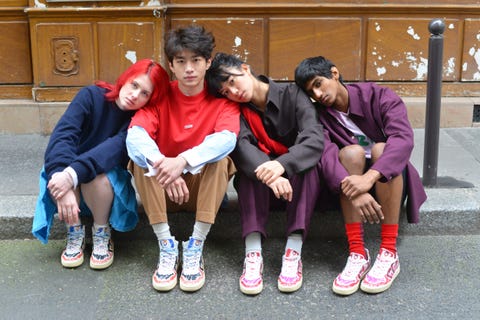If you thought you had no eyelashes left to bat over brand crossovers, one of the more stirring pairings we’ve seen in a minute will dare you to think again. Enter Italian label Marni, French eco-friendly brand Veja, and two very covetable pairs of sneakers.
Unveiled this morning, Veja’s collaboration with Marni’s Francesco Risso consists of Veja’s popular V-10 silhouette and the newer high-top V-15 shoe adorned with bold colors in a scribbled-in style. Evoking a DIY feel that brings childhood to mind, the designs differ from left to right foot to celebrate originality. This, I’m told when speaking with Veja co-founder Sébastien Kopp over WhatsApp, took six months to get exactly right.
One of the most ethical brand linkups to come out of the sneakerhead-sphere as of late, the Veja x Marni shoes were made at Veja’s Fair Trade factory in southern Brazil, constructed from REACH-compliant Uruguayan leather soles made from 31 percent Amazonian rubber, 22 percent rice waste, an 12 percent recycled leather. Each pair also comes with two pairs of 100 percent recycled polyester laces (one multi-colored, one white). A limited quantity of sneakers are available for pre-order now, with women’s sizes also available on 24S and men’s on Farfetch.
Below, read ELLE.com’s exclusive interview with Veja’s Sébastien Kopp and Marni Creative Director Francesco Risso about the collaboration.
When did the idea for a Veja x Marni collaboration come about? What drew you both to wanting to work together?
Francesco Risso: At Marni we had been looking at responsible business models for quite some time, looking for brands to collaborate with, brands that put integrity at the forefront of their practice. The conversation started at the beginning of 2021 and the formula was immediately clear: we would have combined the unorthodox design approach of Marni with the integrity of Veja.
Sébastien Kopp: For 5 years, we’ve had a lot of proposals from brands that are contacting us, and most of the time we say no because we don’t want to do too many collaborations and because we know it takes a long time, and that’s a long journey. Marni contacted us and we love the brand. We love what they’re standing for. They produce in Italy and Europe, and this is important to us–where the goods and clothing are produced. And we love the eccentricity of Marni: The colors, the freedom they have in their creativity. It was important to us to meet with them in person to know if there’s a fit. The whole process took two years to start. We were charmed by Francesco and his team—really nice people, really creative people with no limits.
The collaboration has a joyful and slightly nostalgic feel to it. What inspired this?
FR: I wanted the design to bear a personal touch–something evoking DIY, personal and universal at once. The V-10 and V-15 styles, that we revisited through the collaboration, have this sort of mid-80s vibe already, and they reminded me immediately of the trainers we all wore as teens, so the scribble idea came around immediately. Color alone could not do all and the scribbled motifs give off a sense of naïve “rebellion,” a sense of carefree – as the child at play.
SK: Yes, you’re right, it [the collaboration] has a regressive feeling. And I think the sneaker world is really much like this: It has something to do with childhood and the freedom of childhood. Like when you paint the walls of your parents’ house. We wanted to give this touch of freedom and childhood to the sneakers.
On the topic of nostalgia, what were some of your favorite sneakers growing up?
SK: We [Sébastien Kopp and François-Ghislain Morillion] created Veja because we were not sneakerheads, not guys who collect hundreds of pairs. We loved particular sneakers. I loved hiking sneakers when I was a teenager—hiking, mountain sneakers, or Nike ACJ sneakers. What we love—François, my partner and I—are casual sneakers.
FR: Converse Chuck Taylor, hands down.
As major players in the fashion industry, what are some of the biggest changes you think are needed to create a more conscious industry?
SK: You know, it’s very simple. I don’t want to give advice to anyone, but it connects back to [knowing] who is doing the raw materials and the garments. When you don’t have this connection, I think you can go crazy because you don’t have traceability. You don’t know who is doing what, who is paid what, what the components are of your trousers, dress, products, etc. I think this link has been lost for a long time now.
I think together, we have the means to build this connection again. And I think this connection changes everything—the vision of everybody from the farmers to the designers.
FR: I think we need to interpret the notion of “consciousness” more broadly. And in that sense Veja is the greatest example: their interpretation of responsible business goes way beyond environmentally-friendly production and waste-reduction, because it taps into social responsibilities and social impact too, highly factoring the human component. More than anyone else, they have understood that conscious decision-making is all-encompassing, and has humanity at its core. Also, I think that conscious decision-making should not only concern the business practice, but it must pertain to the creative process, too.
Sébastien, can you speak to some of the ways Veja sources its eco-friendly materials?
SK: At the beginning, we just wanted ecological raw materials. Then, when you are in the Amazonian forests, you realize it’s not just ecological raw materials—we wanted also to be socially balanced. We’ve been doing this [Veja] for 17 years now, and we realized maybe 5 or 6 years ago that we were the only brand to do it like this—that no other brands are going to the fields to meet the organic cotton producers or the Amazonian rubber tappers. This personal link changes your vision and your way of working—when you know people, you want to fight for them, to fight with them. The vision of Veja is the fieldwork.
Francesco, you’ve incorporated upcycling into your recent collections. Take for example, the crowns we saw in Milan earlier this week at your FW22 Vol.2 show. What do you enjoy most about the upcycling creative process?
FR: The fascinating thing about upcycling is that allows objects to show their immortal soul—across past and future. It’s a method for taking care of frailties, preserving value, treasuring objects that remind us of who we have been and who we will be.
How do you hope people feel when they wear the Veja x Marni shoes? Do you have any thoughts on how to style them?
FR: I hope they feel like they’re challenging the seriousness of dressing up and that awkward “same-ness” that sometimes exists in the world.
SK: I think with dressing yourself, if you are really comfortable with what you wear, you will have style no matter what.
This content is created and maintained by a third party, and imported onto this page to help users provide their email addresses. You may be able to find more information about this and similar content at piano.io



